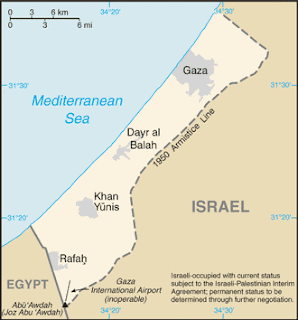Tuesday, February 26, 2008
Failed Gaza Policies
The latest Haaretz-Dialog poll shows that a majority of Israelis support direct talks with Hamas in order to achieve a cease fire and free Gilad Shalit. Most Israelis are simply fed up with the continuing rocket fire on Sderot, and they are skeptical about the military's ability to bring about a lasting solution. They also do not want Gilad Shalit to become another Ron Arad. However, significant obstacles stand in the way of such talks. Israel is bound by commitments it has made to the U.S. and the Palestinian Authority's Abu Mazen.
Both Israel and the U.S. have been pursuing a policy of regime change with respect to the Hamas government in Gaza. The aim of the blockade is not only to prevent the smuggling of weapons and materials for rocket production but also to thwart the Hamas government's ability to function. The hope seems to be that Hamas's inability to provide services and the Gaza Strip's growing isolation would lead Palestinians to reject Hamas in favor of Fatah. This policy has so far failed. While Hamas has not necessarily gotten stronger, it has not declined significantly enough. Furthermore, Fatah forces are not ready for a take-over, and even if such a thing were to happen, it is not at all clear that they would have the support of a majority of the population.
Israel's other policy vis-a-vis Gaza has evolved in the face of the continued qassam attacks since the disengagement. Today, it consists of frequent incursions to arrest wanted men, infantry ambushes of Palestinian fighters, air force attacks against qassam crews, and occasionally artillery strikes. The goal has been to dislodge Hamas and other Palestinian forces from the border with Israel. Occasionally, Israel has also assassinated military and political leaders. Alongside this activity, there has been extensive planning for a major ground operation similar to Operation Defensive Shield in the West Bank in February 2002. The aims of all of these policies are mainly tactical; they do not necessarily seek to bring down the Hamas government but rather try to make it difficult for Palestinian forces to mount attacks against Israeli military and civilian targets.
There is no doubt that Hamas will use any chance it gets - whether through a formal cease fire, informal truce, or direct talk - to build up its offensive arsenal and its defensive capabilities, taking Hizbullah as its model. Thus, the worst solution would probably be an informal truce or deescalation, of the type that has existed sporadically between Israel and Hamas. While it may guarantee temporary security to the residents of Sderot, it will endanger their lives to an even greater extent in the long-term and yields no real guarantees of any kind in the interim. Direct talks, however, are probably off the table - certainly as long as President Bush is in power. Thus, what we are likely to see is an ongoing war of attrition, that may explode into a full-out IDF offensive when a qassam rocket achieves a direct hit killing a family or a group of schoolchildren. Such an offensive, however, will hardly be able to eradicate the qassam firings. Without a diplomatic horizon, all the IDF can hope to do is to keep the various militant organizations operating in the Strip off-balance. That is a very modest aim that can hardly justify an operation with dozens of IDF casualties.
Subscribe to:
Post Comments (Atom)

No comments:
Post a Comment